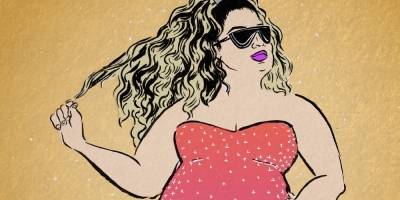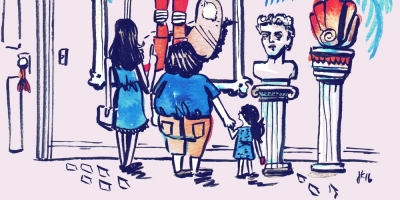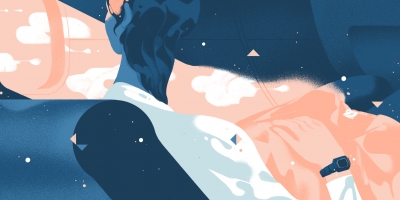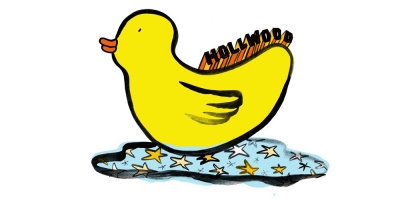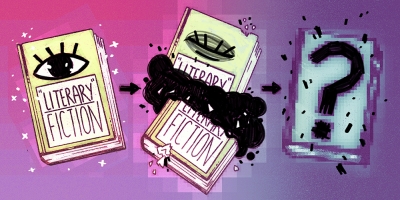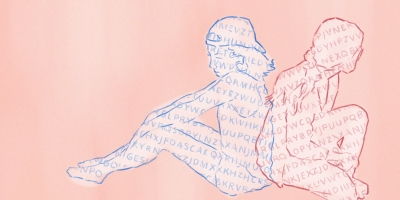Nonfiction
The Boy Who Never Cried for Me
by Julián Delgado Lopera

In this story, Miami is the Promised Land. The Promised Land steaming with floating particles of piss, tanning lotion, my mama’s Revlon dark rouge lipstick mixed with my tía’s spit propelled out of her mouth as she dragged our bags out into the airport parking lot, as she chewed bubblegum while yelling, THIS IS MIAMI, DON’T YOU SEE? WE GOT A WHITE VAN, mira mira. See the white van? See it? HERE IN MIAMI WE GOT A VAN AND AIR CONDITIONING. DID YOU BRING THE BREAD? Mueche a ver, dónde está el pan? HOW WAS THE PLANE RIDE? LIKE SHIT I SUPPOSE. EVERYTHING IN COLOMBIA IS MIERDA MIERDA MIERDA. And WHY ARE YOU CRYING? WHY IS SHE CRYING? You see that? That’s our white van!
After the three-hour plane ride, they greeted us with a prayer and we greeted them with smashed bread bought at eight in the morning that day at a local panadería millions of kilometers away. This bread smells like Colombia, my tía said as she bit on the pancito con uvas pasas, and I could not tell if it was a good or a bad thing. On the phone twelve years later, when I ask my sister what’s the first thing she remembers of our arrival to Miami, she says the smell, it smelled like white people. Then she corrects herself: I thought it was the way gringos smelled, but I realize now that it was just the air-conditioning and these make-believe hollow walls. Did you cry? I ask her. Do you remember crying? Duh, Juliana, why you asking stupid questions again? she says, handing my mama the phone.
Here’s the deal: That day, we’d left Bogotá PARA SIEMPRE, and I remember asking my boyfriend to finger me one last time in the airport bathroom. I stroked his beard, played with his greasy hair, asked him if he would visit me in Miami. Was he sad I was leaving? But was he real sad?
Pablo, I said, we’re never seeing each other again. Never. Do you understand what that means?
He gave me his dirty Casio watch, a baby-blue digital thing that beeped every hour and was way too big for my wrists. Biting on his pierced lip, he mumbled some communist shit about love—of course, that’s what Pablo would do. Quote some Zapatista motherfucker while I was trying to get him to cry. Give me a history lesson about the Mexican revolution while I internally bit my lip, my tongue, my bored-as-fuck heart, wanting him to touch me, wanting him to cry, wanting him to break into song like René from Salserín (girl, don’t judge) and drown every policía bachiller in this verraco airport with his tears.
Ever since Mami informed us we were moving to Mee-a-mee with our tías, I couldn’t wait for that moment of sobbing at the airport, that moment when my boy’s heart would rip, bounce into the tile floor, land in my hands so I could care for it like a dying bunny. All my girlfriends were there: fifteen Catholic-school uniforms munching on Happy Meals. I knew this was my last moment to shine, that after lying about every single Camilo, Diego, Daniel, Roberto, after writing myself love letters in ugly boy handwriting, after tricking my sister into sucking on my neck, and after sucking on mangos and pineapples for hours to convince everyone I was the mera mera queen of dick or whatever, leaving the country forever was the perfect drama-infused opportunity for a boy to declare his love to me. And this was a real bone-flesh boyfriend—your average trigueñito colombiano, but still—I had broken up with all the imaginary ones.
Everyone had to see this: that I could be loved, that someone could love me like this, that this eighteen-year-old criollito kid was about to lose his shit over this fifteen-year-old long-gone pussy.
I wanted to squeeze every bit of dramatic tension I could out of the four hours spent at El Dorado Airport. I wanted my Daniela Romo moment. I was Daniela Romo, carajo, me. Because qué carajo this migration and the Avianca plane. Qué carajo our lives packed in two Samsonite bags, the merengue I wouldn’t hear again for two years flowing from the nearby cafeteria. Wilfrido, mi amor, you’re only missed in exile. Qué carajo Mami’s blow-dried hair hiding our collective sadness and my sister’s clueless glossy eyes and my other tía chain-smoking and some guy I’ve never seen hugging Mami, kissing her neck. Qué carajo the pieces of ourselves that refused to leave. The pieces that never left and are still roaming at El Dorado, forever stuck drinking watered-down tintos. Qué carajo, cachaco, qué clase de misunderstanding. And the cleaning lady in the bathroom throwing a puta side-eye, the fabuloso smell, the roscón I barely ate because of nausea, the cordillera boycotting my ass for leaving mi patria, the Bon Bon Bums sticking out of my bag, the knots on my arms, my ribcage. Qué carajo irse. MAMITA, THIS WAS MY DANIELA ROMO MOMENT. I only wanted his tears.
When we eat our Happy Meals, all the girls cry. All the girls but me. My fifteen girlfriends plus my sister’s fifteen girlfriends, all sobbing, snorting snot, asking for napkins, then sobbing again, snorting snot, asking for napkins, then sobbing again, snorting snot, asking for napkins. You get the picture. But yours truly? Na-nais, not one drop of water. Some girls cried so intensely, their entire faces were covered by a thin, transparent film of snot, like they’d been eating pussy for five hours and now it dripped and mixed with the Happy Meal cheese, all going back inside their mouths where it started.
Juli, they say, Juli, marica, huevón, Juli, qué mierda marica, qué mierda. None of them finish their sentences.
We’re at the McDonalds on the corner of the second floor, you know, of the old airport with the pink floors and low ceilings and una musiquita in the background, interrupted every five minutes with an update on Fulanita’s stolen purse, Sutanita missing the plane, María X-Y-Z please pick up your child at the Avianca counter. Every so often, this omnipresent voice reminding us we’re gone, we’re not even here anymore, please, international passengers, proceed to migración—the plane already left with us in it. Mi reina, we’re already mas allá que acá. But I refuse to hear the intercom or Mami’s exasperated hands gesturing to me to behave or my sister’s cry for another Sharpie so Margarita can finish writing a friendship love letter on her school shirt.
I stare at Pablo, trying to figure out what his crying game is. He’s focused on licking an Oreo McFlurry and handing out napkins to all the lloronas. My friends all think he’s such a papasito, how lucky I am to have him, look at that beard and those brown eyes, and, mi reina, he knows how to dress. But the papasito doesn’t shed a tear. The papasito and I have been dating for two months, which in teenager years is a lifetime full of passionate love, mixtapes, unfulfilled promises, and, in Pablo’s case, too many ideological rants. He smiles at me, grabs my hand, draws circles inside my palm, kisses my neck. He writes TE AMO with his index finger on my jeans in all caps. He swears he’ll visit, swears we’ll get married in freaking Villa De Leyva papá (to the grand amusement of my mother who, years later, chuckled, calling us unos pobres culicagados), swears with whispers and slimy kisses that I don’t return because I’m fucking furious, because there’s only twenty minutes left before we have to line up for customs and Pablo, mi amor, dónde están tus tears? I want to take them with me.
On the phone years later, when I ask Mami about that day at the airport, she says she remembers the mayonnaise taste of the Big Mac and the ugly green sweater your boyfriend gave you, nena, and your tía Dominique who wasn’t there. She didn’t make it to the airport. She had to be hospitalized that morning because of heartbreak. Se le rompió el corazón, it was all too much for her. And your amigas, por Dios, crying como si se estuviera acabando el mundo.
But the world was ending, Ma, no?
Masomenos.
Pero, like, did you cry, Ma?
It takes her a moment to answer. I can hear my sister yelling in the background, the fridge in my mom’s house opening and closing, Christian music making its way to the phone.
I didn’t cry, she says proudly. I was keeping it together for you.
I know it’s time to go into customs because Mami’s face changes to a nervous smile as she gathers her purse, her coat, the passports, one last bite into that Colombian Big Mac. Her jet black hair one wave of sadness. She doesn’t say anything, but she doesn’t have to. The waves of her perfect straightened hair pull us into action—hair straightened that same morning in a house that is not our house by a window with no view, straightened flawless at six in the morning while Mami thought nobody but the hairdresser saw her scribbling invisible notes to my father. Invisible notes to herself. While she bade adiós to the damn city, the damn life en este país de mierda from a window with no view. Este país de mierda that we will never miss because, cachaco, nos vamos pa’l norte, a la Promised Land. Y este país de mierda that we will never leave, that we’re leaving right now as we kiss good-bye the rows of onlookers that are our life, este país de mierda will be nothing but a shadow, nothing but a ghost que baila pegadito.
The waves of her hair call on us. And I’m almost done with my ice cream, but still no tears from Pablo. I’m passive-aggressively scooping ice cream, jamming it in my mouth, vanilla dripping from the corners of my lips onto the floor. The last time Mami ate ice cream, she was divorcing my father over some cookies and cream with arequipe. She didn’t cry then either. Not in front of us. Mami had this thing where she locked herself in the bathroom for hours with a notebook, a pen, and a yellow highlighter. She then came out with a new family plan, all energized like nothing had happened, ignoring the sadness that had fueled her, yellow stains covering her mouth and palms. I braided her hair after. I combed and braided it while she went on and on about the new life plans she had for us girls, us three girls. She took notes about our life, she had a plan. This was the plan. La Promised Land and the white van. The ice cream dripping from my mouth was part of it.
My fucking boyfriend now only chuckling, of course, and I’m toda emputada, toda heated up, toda que te mato, Pablo, for killing my dreams, because you’re supposed to be just water right now, just a well of sadness begging and pulling me to you, you’re supposed to give me five reasons to stay, you’re supposed to rip that passport in two, supposed to heal Mami’s heart with Vick Vaporú, clean her mouth and palms so she never joins my tías and their white van, you’re supposed to lick the ice cream as it drips and bring it back to me.
Pero, mi reina, we never really leave.
We cross the charco with a bag full of feelings, a somber look, and jars of Vick Vaporú to heal Mami’s heart. We never leave. We don’t really know how to. We climb into that plane like a herd of sheep after swearing to the customs guy this is a trip to Disney World, señor, ain’t nobody gonna stay in some muggy-ass swamp full of rednecks and crocodiles. Mami had my sister and me practice saying, Hola, señor de la aduana, we’re going to Disney World. Again, she’d say to us in front of the bathroom mirror. Hola, señor de la aduana, we’d say in unison, we’re going to Disney World. No, señor, we don’t plan on overstaying, we have a life back home, we have a house back home, I have a boyfriend back home who cries for me.
When we eat the smashed bread with my tías after landing in Miami, my grandmother is there, too. It’s like when we were all in Bogotá, but instead of wearing black and gray, instead of having antique, gothic, creepy porcelain dolls as ornaments around the house, they’re all wearing fucking pastels, Bermudas, flip-flops. They are all sweating. Nobody can smoke inside the house, and they’re all proud to have “made it.” La Promised Land, cachaco, te cuento. They’re giving us a rundown of how shit happens around here. We’re in Miami now, they say, esto es Estados Unidos.
Pero, like, we’re still in Bogotá. Todavía because, te digo, we never really leave. Because I don’t understand what leaving means. I don’t know it takes months, years, decades to leave. That I’ll always be stuck at that airport. That we would fly on a plane, land in a swamp, grow mold on our eyes from the humidity, scales on our chests from the air-conditioning. That even when we landed, even when the Florida sun outside dared us to die fried, lonely, and wearing three-dollar Walmart leggings, even when the TV promised INGLÉS SIN BARRERAS, the barrera was already there, the barrera never moves, never softens.
When we’re on the plane, my sister cries. Mami holds our hands in prayer, and I look out at the cordillera and think about Pablo’s dry motherfucking eyes as mine begin to water. All I can do is imagine Daniela Romo. I call the goddess to sit with me and hold me, wrap me in that thick, gorgeous mane of hers, and rock me until I’m a plátano maduro, until I ripen into something more, something beautiful.
